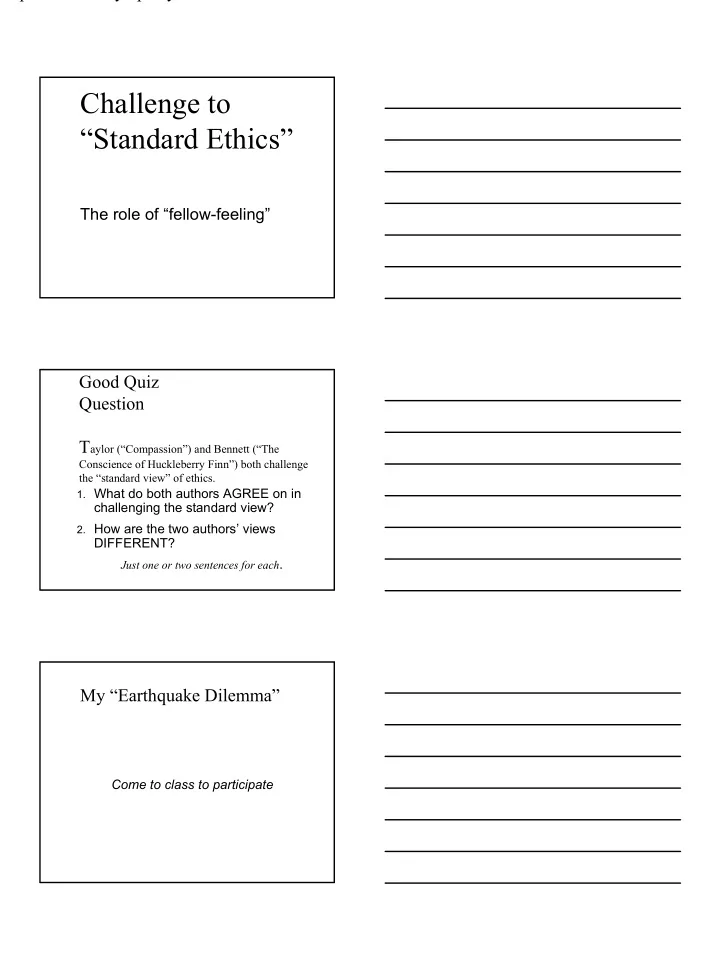

Compassion and Sympathy Challenge to “Standard Ethics” The role of “fellow-feeling” Good Quiz Question T aylor (“Compassion”) and Bennett (“The Conscience of Huckleberry Finn”) both challenge the “standard view” of ethics. 1. What do both authors AGREE on in challenging the standard view? 2. How are the two authors’ views DIFFERENT? Just one or two sentences for each . My “Earthquake Dilemma” Come to class to participate Phil 240: Ethics 1
Compassion and Sympathy Taylor: “Goodness of heart, tenderness toward things that can suffer, and the loving kindness that contradicts all reason and sense of duty...shine like a jewel.” (p. 46) [my emphasis] “We have in all these cases a real war between the head and the heart, the reason and the will, and the one thing that redeems them all is the quality of the heart, which somehow withstands every solicitation of the intellect. It is the compassionate heart that can somehow make itself felt that makes men’s deeds sometimes noble and beautiful, and nothing else at all.” (p. 47) Compassion over Reason “The impulse of compassion so far transcends reason that it can as easily as not contradict it. It is sometimes the very irrationality of compassion, the residual capacity to respond with tenderness and love when all one’s reason counsels otherwise, that confers upon a compassionate act its sweetness, beauty, and nobility. (p. 50) Phil 240: Ethics 2
Compassion and Sympathy Taylor: Wrong Approaches � Morality subjective. Protagoras: “man is the measure of all things” (pp. 134-35) Subject Object [subjective view] Subject Object [objective view] � For Taylor morality is objective but not rational. Taylor: Wrong Approaches � Consequences don’t make actions moral or immoral � Suffering is part of life. Cancer death (e.g.) is an evil but not a moral evil (p.50) � Moral goodness and evil comes from requires moral agent. � Kant is right in locating the morality of action in the moral agent, not in the results. � But Kant wrong to emphasize reason instead of compassion. Phil 240: Ethics 3
Compassion and Sympathy Taylor and Mayo Both Skeptical of Unifying Principles � Ultimate aim of ethics: to formulate a correct moral theory � Most philosophers recognize that this may be complex or pluralistic � Still, standard approach struggles for unifying standards, perhaps through a method of reflective equilibrium . Mayo and Taylor reject principle- based ethics � Mayo: “Of course we can in theory give a unity to our principles...but the attempt to construct a deductive moral system is notoriously difficult and in any case ill-founded .” (p. 305, my emphasis) � Taylor: clearly rejects pure rationality, but “most men...know just what human goodness is when they see it, whether they have read treatises...or...tried to fathom its metaphysical foundations. For the fact is, it seems to have no such foundations. Romantic vs Rational/Enlightenment Views � Are “innocent” children more moral than sophisticated, “civilized” adults? Romantic view: yes. Civilization corrupts � Lord of the Flies (novel) counter-example. � Taylor: human kinship with rest of creation. Morality applies to all beings that can suffer. Phil 240: Ethics 4
Compassion and Sympathy Bennett: Sympathy vs “Morality” � Huck Finn: acts on his sympathies, opposes bad morality � Heinrich Himmler: acts on his bad morality in spite of his sympathies � Jonathan Edwards: suppresses all sympathies Nice guy, Heinrich “What happens to a Russian, to a Czech, does not interest me in the slightest…Whether 10,000 Russian females fall down from exhaustion while digging an antitank ditch interests me only if so far as the antitank ditch for Germany is finished.” More Heinrich Himmler “I also want to talk to “To have stuck it out and you quite frankly on a at the same time…to have very grave matter. I remained decent fellows, mean…the this is what made us hard. extermination of the This is a page of glory in Jewish race…Most of our history…” you know what it mean when 100 corpses are lying side by side, or 500, or 1000. Phil 240: Ethics 5
Compassion and Sympathy Sympathy vs “morality”? � The conflict is with a bad morality based perhaps on custom (for Huck Finn) � Is this a false dichtomy: custom vs sympathy? � What alternative to customary morality and sympathy? � Answer: Philosophical/critical ethics Bennett recognizes this “Huck clearly cannot conceive of having any morality except the one he has learned…from his society…. “The basic trouble is that he cannot or will not engage in abstract intellectual operations of any sort.” (p. 146) Phil 240: Ethics 6
Recommend
More recommend